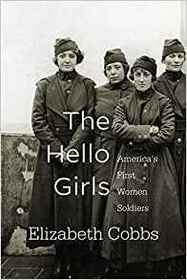This is an interesting book about the female switchboard operators who served our country in World War I, but the author also tightly connects it to the woman's suffrage movement of that period. In fact, much of the early chapters is devoted to that, so, if that doesn't interest you, keep reading and the story of the "Hello Girls" will reward you. Still, the suffrage movement was an important issue at that time and the author weaves it well into the switchboard operators' story. She also makes the point that woman's suffrage influenced other critical issues of that period.
Although their involvement was strongly resisted at first, the female switchboard operators were eventually recognized as a great asset by the U.S. Army, despite the fact the women didn't receive any benefits. Most of this was due to the mind-set of the Secretary of the Army and other officials. Some of their reasoning was mind-boggling. For example, one thing I picked up on was female switchboard operators weren't considered important enough to actually be enlisted into the service, which robbed them of benefits for decades. But their loyalty had to be beyond doubt, as the conversations they listened in on often contained secret information on troop movements, which even enlisted men and commissioned officers weren't party to. If you wonder how this kind of reasoning could happen, you obviously haven't spent any time in the military.
The author also discusses other war-time organizations involved women. She mentions "sailorettes and marinettes" several times. These women were actually enlisted. As a former Marine officer I had never heard the term "marinettes" before, and wondered where the author found it. I do know that during World War II, when the Commandant of the Marine Corps was asked what nickname women Marines should be called, his reply was "None! They are Woman Marines."
I also found it interesting that back then, as stated on one page, people who lived in California were called "Californiacs." Which some people today might think is more appropriate than Californians. :-)
Although their involvement was strongly resisted at first, the female switchboard operators were eventually recognized as a great asset by the U.S. Army, despite the fact the women didn't receive any benefits. Most of this was due to the mind-set of the Secretary of the Army and other officials. Some of their reasoning was mind-boggling. For example, one thing I picked up on was female switchboard operators weren't considered important enough to actually be enlisted into the service, which robbed them of benefits for decades. But their loyalty had to be beyond doubt, as the conversations they listened in on often contained secret information on troop movements, which even enlisted men and commissioned officers weren't party to. If you wonder how this kind of reasoning could happen, you obviously haven't spent any time in the military.
The author also discusses other war-time organizations involved women. She mentions "sailorettes and marinettes" several times. These women were actually enlisted. As a former Marine officer I had never heard the term "marinettes" before, and wondered where the author found it. I do know that during World War II, when the Commandant of the Marine Corps was asked what nickname women Marines should be called, his reply was "None! They are Woman Marines."
I also found it interesting that back then, as stated on one page, people who lived in California were called "Californiacs." Which some people today might think is more appropriate than Californians. :-)




